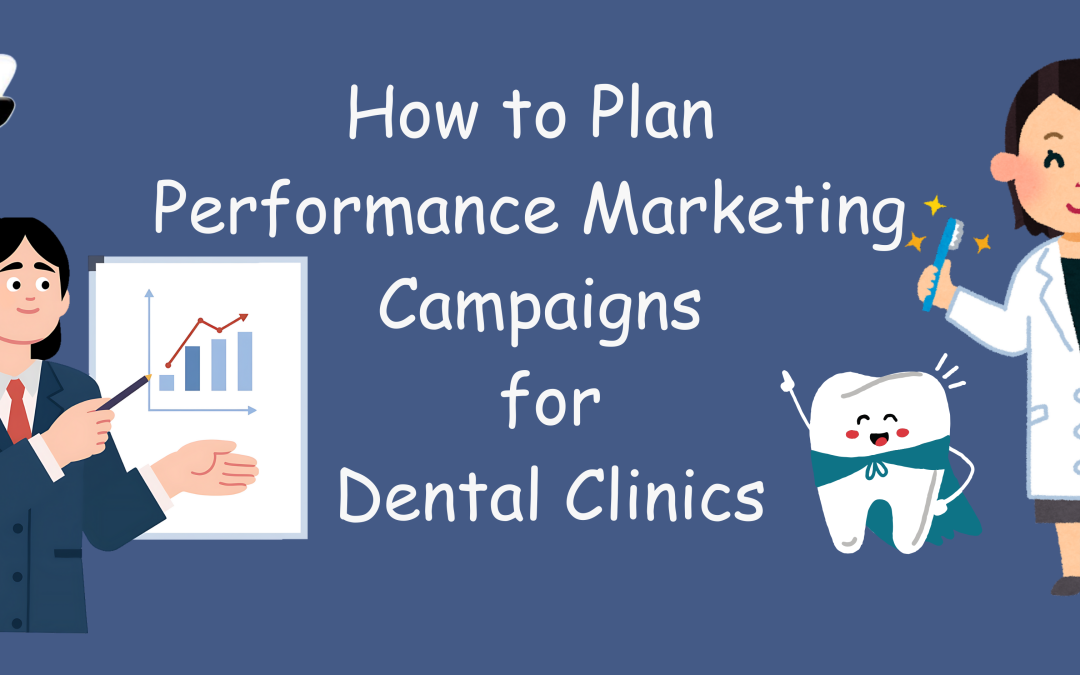
by Shashikanth Heerekar | Jan 31, 2026 | Digital Marketing
Introduction
Performance marketing means you only pay for results that matter, such as patient bookings or contact form submissions. Unlike traditional ads, where you pay just for exposure, performance marketing makes sure every dollar spent can be measured and brings value.
For dental clinics, this approach helps you reach people who are actively searching for dental services. Patients often look online with specific needs, using phrases like “emergency dentist near me” or “best dental implant clinic.” Showing up in these searches makes your clinic visible at the right time.
When dental clinics focus on performance marketing, they can avoid wasting money on ads and reach patients who are more likely to book appointments. This method lets clinics track which campaigns, keywords, and ads work best, so they can make better decisions over time.
The Current Landscape of Performance Marketing in the Dental Industry
Most dental patients now begin their search online. They use Google, read reviews, and compare clinics before booking an appointment. Because of this shift, having a strong online presence is essential for every dental clinic.
- Most people searching for dental appointments look for dentists near their location.
- Clinics that show up in Google search results and local map listings get more calls and bookings.
- Using both paid ads and organic SEO is most effective. Ads give you immediate visibility, while SEO helps build long-term trust and authority.
Performance marketing is now essential for dental clinics that want steady growth.
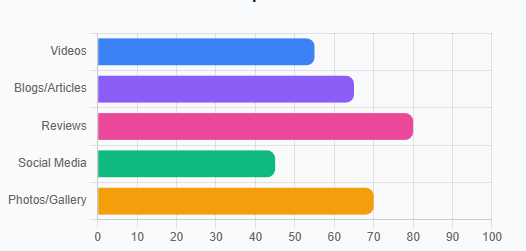
This graph explains that reviews (80%) are the most effective content type, followed by photos/gallery (70%) and blogs/articles (65%). Videos (55%) have moderate impact, while social media posts (45%) show comparatively lower effectiveness.
Key Benefits of Implementing Performance Marketing Campaigns
Performance marketing gives dental clinics several key benefits:
1. Local searches dominate:
Patients often search for dentists close to them, using phrases like “dentist near me” or “emergency dental clinic in [city].” Clinics that show up in these local searches and on Google Maps get many more calls and bookings.
2. The rise of mobile searches:
More than half of dental searches happen on mobile devices. That’s why it’s important to have a mobile-friendly website and fast-loading landing pages. If your clinic’s site is slow or hard to use on a phone, patients might leave and pick another clinic.
3. Patient reviews are more influential than ever:
Online reviews on Google, Yelp, and health directories are very important for patient decisions. Clinics with good reviews are more trusted, and Google often ranks them higher in local searches.
4. Paid ads and organic SEO work best together:
SEO helps your clinic get long-term visibility, while PPC ads can bring in immediate traffic and bookings. Many dental clinics now use both methods, running Google Ads for high-intent services like “Invisalign dentist” and also improving their website content for organic search.
5. Content marketing is growing:
Patients want information before making decisions. Blogs, FAQs, and videos about dental procedures help clinics educate patients, improve trust, and boost search rankings. For instance, a blog about “what to expect during teeth whitening” can attract patients searching for that service.
6. Social media influences decisions:
Platforms like Instagram, Facebook, and YouTube do more than build your brand. They also influence patient choices. Clinics that share educational content, success stories, and promotions can get more engagement and encourage bookings.
For instance, a clinic offering Invisalign in Hyderabad can target the keyword “Invisalign dentist Hyderabad” to attract the right audience at the right time.
Essential Components of a Successful Performance Marketing Strategy
To succeed with performance marketing, dental clinics need to plan and execute their strategy carefully. Each part is important for attracting the right patients, turning leads into bookings, and making sure your marketing budget is used well. Here’s a closer look:
1. Define Clear Goals
Clear, measurable goals are the foundation of any successful campaign. Without them, you can’t track performance or improve your campaigns effectively.
Some example goals include:
- 20 new patient bookings per month
- 50 qualified leads from the website
- Increase appointment calls by 30%
Specific goals help you track progress, measure ROI, and make better decisions.
For instance, you can also set secondary goals like increasing newsletter sign-ups or social media engagement, which supports long-term patient relationships.
2. Keyword Research (Including Long-Tail Keywords)
Keywords are the core of your performance marketing campaigns. Long-tail keywords attract patients who are looking for specific services and usually lead to more conversions than broad terms.
Examples include:
- “Emergency tooth extraction near me”
- “Affordable braces clinic in [city]”
- “Best dental implant clinic for seniors”
For example, someone searching for “pediatric dentist in [city]” is likely ready to book a child’s appointment, so they are more likely to become a patient.
3. Build High-Performance Landing Pages
Landing pages are where potential patients decide to take action, so they need to be designed to encourage conversions. A good landing page should be:
- Fast-loading: Slow pages frustrate users and make them leave.
- Easy to read: Use clear headings, bullet points, and short paragraphs to make your page easier to read.
- Mobile-friendly: Most dental patients search on their phones, so your pages should look good and work well on any device.
For example, if you run an ad about teeth whitening, link it to a landing page with details about the service, pricing, testimonials, and a clear booking button. Don’t mix multiple services on one page, as this can confuse visitors and lower conversions.. PPC Ads for Dental Clinic
PPC ads help your dental clinic reach patients who are actively searching for your services and give you instant online visibility. Unlike SEO, which takes time, PPC ads can bring in traffic and appointments right away.
Best practices include:
- Target location and service keywords: Show your ads to people in your city or nearby areas who are searching for services like “teeth whitening” or “Invisalign dentist.”
- Use call and direction extensions: Make it easy for potential patients to call or find your clinic right from the ad.
- Set a daily budget: This helps you control your ad spending and test which campaigns work best without going over budget.
For example, if you run PPC ads targeting “pediatric dentist near me,” your ad will show up when parents are ready to book an appointment. These ads work well with SEO by giving you instant visibility while your website builds its organic ranking.
Measuring Success: Key Performance Indicators (KPIs)
Track these KPIs to measure your performance marketing success:
- Click-Through Rate (CTR): how many people click your ads.
- Conversion Rate: how many clicks result in bookings or inquiries.
- Cost per Lead (CPL): how much you spend to get a patient lead.
- Return on Investment (ROI): profit compared to ad spend.
- keyword Ranking: check where your important keywords appear in search results.
Tracking these numbers helps you improve your campaigns and get better results.
Conclusion
A good performance marketing plan uses SEO, PPC, local listings, and regular tracking. By reaching the right audience with clear goals and strong landing pages, your dental clinic can attract more patients and keep growing.
Performance marketing makes sure every dollar you spend goes toward real, measurable results.
By following this guide, your campaigns will focus on real results, making sure every marketing dollar benefits your clinic. Performance marketing isn’t just about ads; it’s a patient-focused strategy for long-term success.
FAQs
1. What is performance marketing for dental clinics?
Ans. Performance marketing for dental clinics is a strategy where you pay only for measurable results, such as patient bookings, calls, or form submissions. It focuses on attracting patients who are actively looking for dental services and ensures your marketing budget is spent efficiently.
2. Why is performance marketing important for dentists?
Ans. Performance marketing is important because it helps dental clinics reach patients at the exact moment they need services. It improves visibility on search engines and maps, leading to more bookings and calls. This strategy also allows clinics to measure exactly which ads, keywords, or campaigns are workin.
3. What are the key components of a dental clinic’s marketing campaign?
Ans. The key components include setting clear and measurable goals, conducting thorough keyword research, creating high-quality landing pages, running PPC ads, managing local SEO and patient reviews, and tracking important KPIs. Each component works together to attract the right audience and convert them into patients.
4. How do I measure the success of my campaigns?
Ans. You can measure success by tracking click-through rates, conversion rates, cost per lead, return on investment, and keyword rankings. These metrics provide insights into how well your ads, landing pages, and SEO are performing.
5. Can small dental clinics benefit from performance marketing?
Ans. Yes, small dental clinics can benefit greatly because performance marketing is scalable and cost-effective. Even with a limited budget, small clinics can target their local audience, track results, and adjust campaigns based on performance.
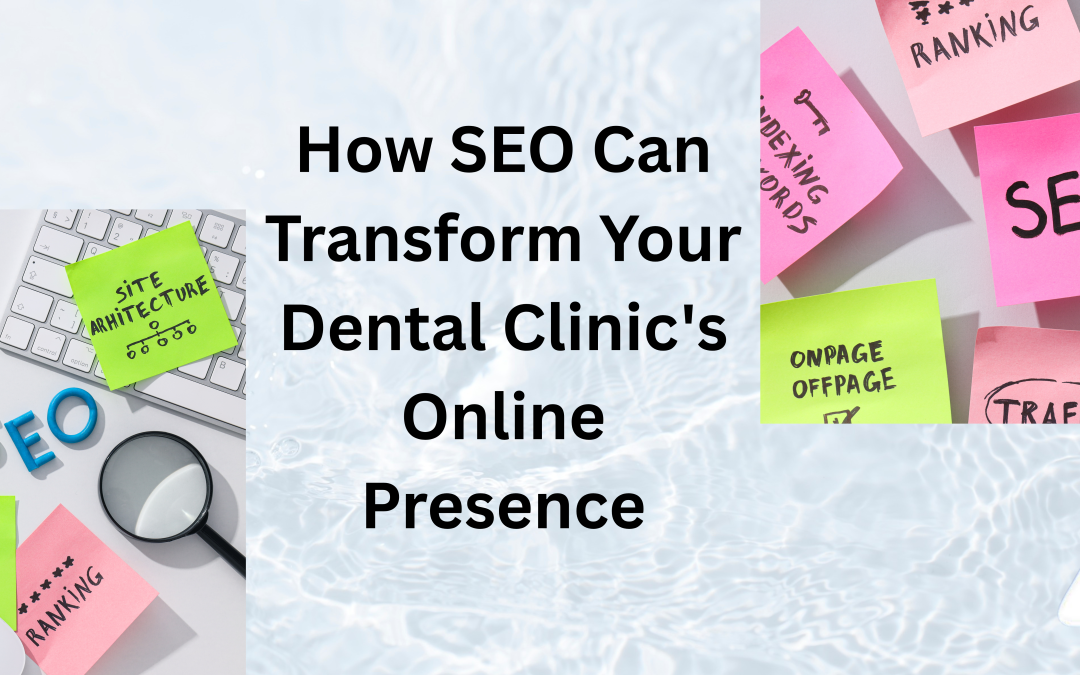
by Shashikanth Heerekar | Jan 23, 2026 | Insights
Having a strong online presence is important for dental clinics that want to attract new patients and keep the ones they have. If you run a dental clinic in India, understanding SEO can help your clinic grow. This article offers practical SEO tips to help your clinic get noticed online, attract more visitors, and boost your revenue.
Understanding the Importance of SEO for Dental Clinics
As more dental clinics open in India, good SEO can help yours stand out. SEO is not just about better search rankings. It helps more people find your clinic online, builds trust, and encourages patients to connect with you. Updating your website can also help address common concerns like fear of dental treatment, costs, and urgent dental needs.
The Problem: Low Online Visibility
Many dental clinics are difficult to find in search results. Since most people use Google to search for dental services, your clinic could miss out on new patients if it does not appear near the top.
The Instrument: Effective SEO Strategies
You can address this issue by using SEO strategies made for dental clinics.
1. Keyword Research and Optimization
Start by learning which words your potential patients use when searching online. Tools such as Google Keyword Planner or SEMrush can help you find keywords for dental services, local searches, and common questions. Use longer, specific phrases like “affordable dental implants in [City]” or “best pediatric dentist near me.”
2. On-Page SEO Techniques
On-page SEO is about improving each page on your website so it ranks higher and attracts the right visitors. Here are the main areas to focus on:
Title Tags and Meta Descriptions: Give each page a clear title and description, and include your main keywords. Use H1 for your main title and H2 or H3 for subheadings. This helps search engines understand your page’s structure.
Content Quality: Write high-quality, helpful content that answers patient questions. Use clear, simple language to explain dental procedures and why oral health matters.
3. Local SEO Optimization
Local SEO matters a lot for dental clinics because most patients search for services nearby. Here are some ways to improve your local search results:
Google My Business (GMB): Claim your GMB listing and check that your clinic’s name, address, phone number, and hours are accurate.
Local Keywords: Include local keywords on your website, such as your city or neighborhood name.
Customer Reviews: Ask happy patients to leave good reviews on Google and other sites. Reply to all reviews to show you care about patient feedback.
The Outcome: Increased Traffic and Patient Engagement
If you use these SEO strategies, your dental clinic should become easier to find online. This means more people will visit your website and get involved. As your search ranking goes up, you’ll get more clicks and more patients.
Measuring Success: ROI and Pricing Considerations
When you spend money on SEO, it’s important to check if it’s working and bringing in good results. Here are some things you can track:
Website Traffic: Use tools like Google Analytics to monitor the number of visitors to your site and track where they are coming from.
Conversion Rate: Check how many website visitors book appointments or contact your clinic. This helps you measure how well your SEO is working.
Cost Analysis: Compare your SEO spending with the income you get from new patients. A well-optimized clinic often receives more patient inquiries, making the investment worthwhile.
Example: A Case Study
For example, a dental clinic in Mumbai used a complete SEO strategy. Before making changes, they had about 50 website visitors each month. After updating their website, improving their GMB listing, and adding local content, they reached 200 visitors per month in six months. This led to 40% more new patient appointments, showing how effective SEO can be.
Conclusion:
To sum up, SEO is a key part of dental marketing today. By following the tips in this article, you can improve your clinic’s online presence, attract more patients, and increase your revenue. If you want to take things further, consider hiring an SEO agency that understands the dental industry. With expert help, you can manage SEO and see long-term results.
FAQ Section
What is SEO, and why is it important for dental clinics?
SEO, or Search Engine Optimization, is about making your website easier to find on search engines like Google. For dental clinics, good SEO helps you attract new patients and keep current ones by appearing in the right search results.
How long does it take to see results from SEO?
SEO is a long-term strategy. Some changes may bring quick results, but it usually takes 3 to 6 months to see big improvements in search rankings and website traffic.
Can I do SEO myself, or should I hire an agency?
You can learn and use SEO strategies on your own, but hiring a professional SEO agency can save you time and make sure your efforts are effective and suited to the dental field.
What are some common SEO mistakes to avoid?
Common mistakes include using too many keywords, not making your site mobile-friendly, ignoring local SEO, and not updating your content regularly. These issues can lower your clinic’s search ranking.
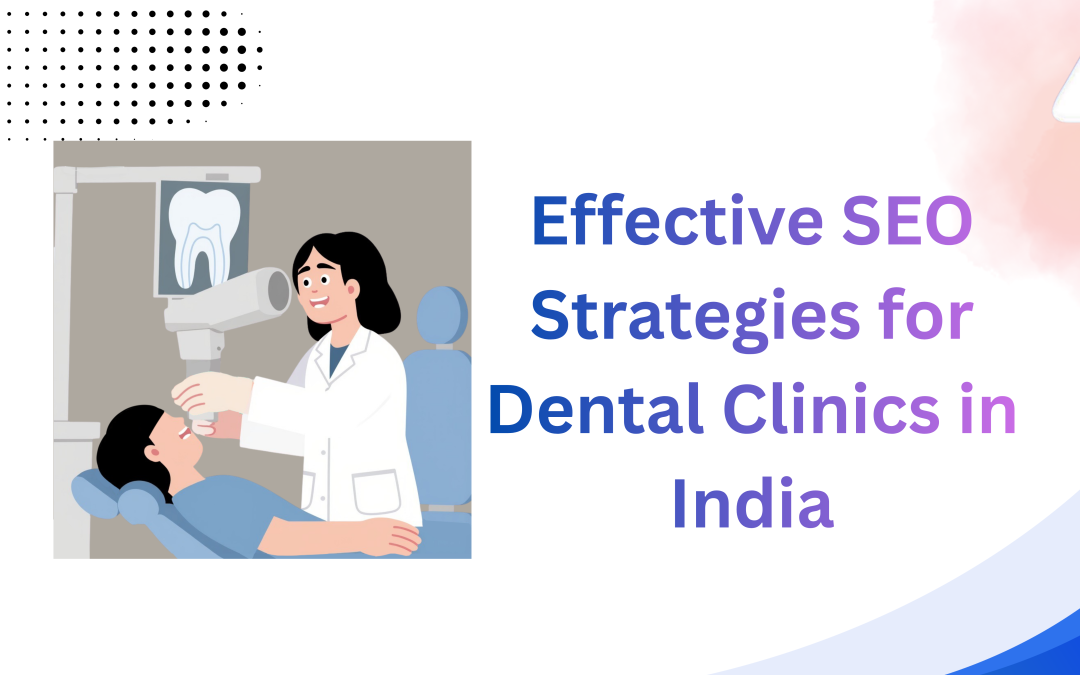
by Shashikanth Heerekar | Jan 22, 2026 | Insights
A strong online presence matters because more people search for dental services online. Good SEO helps your clinic stand out and attract new patients. This guide includes simple SEO tips, advice on common challenges, website setup, and ways to increase visitors.
Understanding the Importance of SEO for Dental Clinics
Before diving into the details, let’s see why SEO matters for dental clinics. Most people begin their search for dental care online, so your clinic should appear near the top of search results. A well-optimized website can help you:
- Increase Visibility: Ranking higher in search results makes it more likely that potential patients will visit your website and book appointments.
- Build Trust and Credibility: Patients are more likely to trust clinics that appear at the top of search results.
- Improve User Experience: Good SEO makes your website easier to use and improves your content, helping keep patients interested.
Key SEO Strategies for Dental Clinics
1. Optimize Your Website Structure
A well-organized website supports your SEO. Ensure your site is easy to use, with clear sections and simple menus. Here are a few tips:
Use Clear URLs: Keep your URLs simple and descriptive, and include relevant keywords when possible. For example, use `www.example.com/root-canal-treatment` instead of `www.example.com/service1`.
Mobile Optimization: Many people use their phones to visit websites, so your site should work well and load fast on any device.
Internal Linking: Connect your pages with clear links. This helps search engines and makes it easier for people to find information.
2. Keyword Research and Targeting
Choosing the right keywords helps you reach your ideal patients. Use tools like Google Keyword Planner or SEMrush to find out what people are searching for. Focus on:
Long-Tail Keywords: These are more specific and less competitive. For example, instead of just using “dentist,” try “best family dentist in [City].”
Local Keywords: Add your city or area to your keywords to attract local patients. For example, “dental clinic in Mumbai.”
3. Create High-Quality, Relevant Content
Good content is essential for SEO. Share helpful information regularly to build trust and keep people interested. Here are some ideas:
Blog Posts: Write about common dental issues, tips for oral care, and new treatments. Make sure your posts are useful for your patients.
FAQs: Answer common questions from your patients in an FAQ section. This can also help with voice search.
Visual Content: Use images, infographics, and videos to make your website more interesting and easier to understand.
4. Utilize Local SEO Tactics
Local SEO matters because most patients search for clinics nearby. Try these steps:
Google My Business: Claim your Google My Business listing and make sure your clinic’s name, address, phone number, and hours are correct. Ask happy patients to leave positive reviews.
Local Listings: Check that your clinic’s name, address, and phone number are the same on every website.
Location Pages: If you have more than one clinic, make a separate page for each one and use local keywords.
5. Technical SEO
Technical SEO involves making your website easy for search engines to find and understand. Focus on these areas:
Site Speed: Make sure your website loads fast. Slow sites can turn people away. Use tools like Google PageSpeed Insights to check and improve your speed.
SSL Certificate: Use HTTPS to keep your website safe and help visitors trust you.
Schema Markup: Add schema markup to your site so your search listings can show things like star ratings and reviews.
6. Monitor and Analyze Performance
Check your SEO results regularly to see what works and what needs improvement. Use tools like Google Analytics and Google Search Console to track:
Traffic Sources: Find out where your website visitors come from so you can improve your marketing.
User Behavior: See how people use your site, which pages they visit, where they leave, and how many book appointments.
Pricing and ROI Considerations
SEO can deliver strong results for dental clinics. The cost of SEO services depends on the agency and your needs. Here are some general guidelines:
Monthly Retainer: Many agencies offer monthly SEO packages that cost between ₹15,000 and ₹50,000, depending on what is included.
Initial Setup Costs: One-time setup fees for a full SEO plan can be between ₹30,000 and ₹100,000.
Long-Term ROI: Good SEO leads to more patient inquiries and appointments, making it a smart long-term investment.
FAQs
1. How long does it take to see results from SEO?
SEO takes time to show results. Most clinics notice better traffic and rankings in 3 to 6 months. Larger improvements can take up to a year.
2. Is SEO better than paid advertising for dental clinics?
Paid ads can bring quick results, but SEO is better for the long run and costs less over time. Once your SEO is set up, it keeps bringing visitors without extra costs per click.
3. What are the most important SEO metrics to track?
Tracking the right SEO metrics helps you understand how your website is performing and where you can improve. Monitor organic traffic, keyword rankings, and click-through rate. Also, check bounce rate, average session time, and conversions to see how engaged your visitors are.
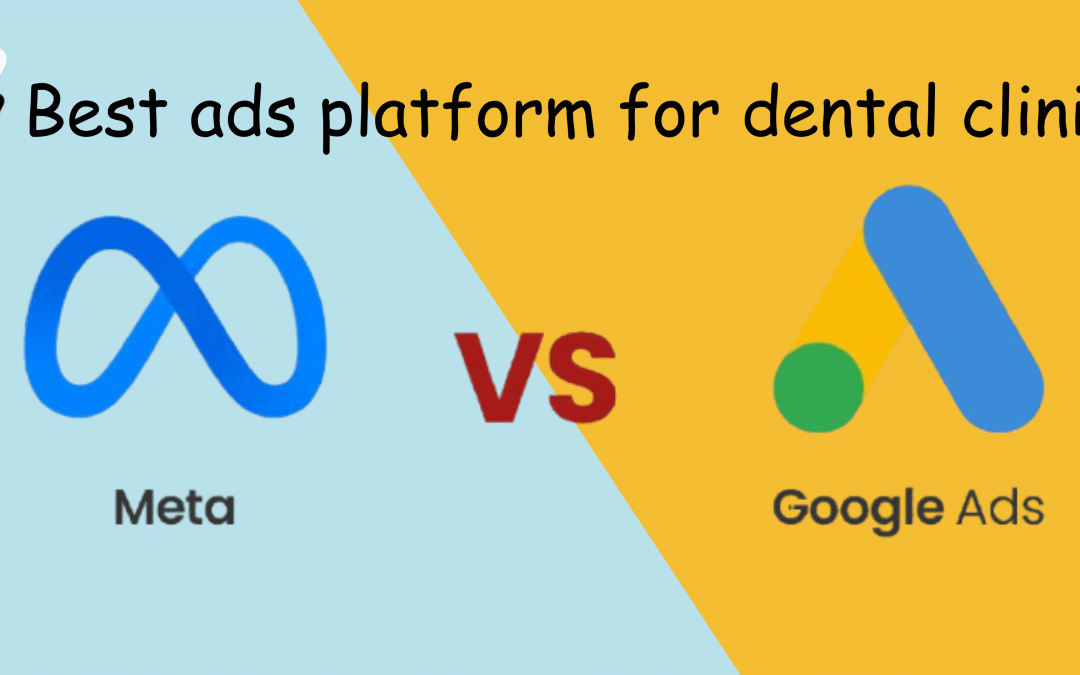
by Shashikanth Heerekar | Jan 20, 2026 | Digital Marketing
Introduction
Advertising plays an important role in helping dental clinics stand out and reach the right audience in today’s digital world. Visual content speaks louder than words; images and videos make it easier for people to understand dental services quickly and clearly.
Even a short two-minute ad on the right platform can create a strong impression, increase engagement, and encourage potential patients to take action.
When it comes to digital marketing services for dental clinics, platforms like Google Ads and Meta Ads (Facebook and Instagram) are among the most effective choices. Both platforms help dental clinics promote their services and connect with potential patients, but they work in different ways.
Google Ads focuses on users actively searching for dental treatments, while Meta Ads help build awareness and trust through visual storytelling. Now, let’s take a closer look at Google Ads and Meta Ads to see which advertising platform delivers better results for dental clinics.
Why Advertising Matters for Dental Clinics
Advertising is essential for dental clinics to improve visibility in a competitive market, build trust through strong branding and positive patient reviews, and attract new patients by highlighting unique services.
It also helps dental clinics educate the community about oral health and treatments while maintaining consistent engagement with existing patients. This ongoing promotion supports long-term, sustainable growth beyond clinical expertise alone.
Effective advertising also allows dental clinics to showcase special offers, new technologies, and patient success stories.
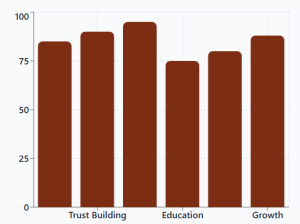
This graph highlights the impact of advertising across three key areas: trust building, education, and growth. Trust building shows the highest performance, indicating that advertising strongly helps dental clinics build credibility and patient confidence. Education scores slightly lower, while growth remains strong, showing that consistent advertising supports long-term business expansion.
For example, a dental clinic can use Google Ads to target patients searching for teeth whitening, while Meta Ads showcase before-and-after patient stories to build trust. These strategies help attract new patients and increase appointments consistently
Importance of Google and Google My Business for Business Growth
The importance of Google lies in its ability to help customers easily find businesses and make informed decisions online. It improves online visibility and connects users with relevant services at the right time.
At the same time, Google My Business helps build local trust through reviews and accurate information.
This also leads to higher local rankings and more customer leads. For example, a local dental clinic appears on Google Maps when patients search “dentist near me,” and its Google My Business profile with positive reviews helps attract more calls and appointments.
For example, a local dental clinic appears on Google Maps when patients search “dentist near me,” and its Google My Business profile with positive reviews helps attract more calls and appointments.
Google Ads vs. Meta Ads: Choosing the Best Platform for Your Dental Clinic
If you are searching for a top dental care provider, finding a good dental clinic with experienced professionals is essential. Many patients look for the best dental clinics that offer modern treatments and excellent patient care.
A well-designed dental clinic website or dentist website design can help you explore services, book appointments, and read reviews from satisfied patients.
When looking for the best-rated dentist near me, a strong online presence and effective advertising strategy, whether through Google Ads or Meta Ads, can make it easier to reach new patients and grow your practice
Best Ads for Dental Clinics: Google Ads vs. Meta Ads
When choosing between Google Ads and Meta Ads (Facebook & Instagram) for dental clinics, it’s important to know which ad types work best for attracting patients, building trust, and increasing appointments.
1. Google Ads (High-Intent, Action-Oriented Ads)
Best Ad Types for Dental Clinics:
-
Search Ads: Appear when patients search for services like “emergency dentist near me,” “teeth whitening cost,” or “dental implants.” These capture high-intent leads actively looking for a solution.
-
Local & Maps Ads: To draw in nearby patients who are looking for convenience, showcase your clinic in Google Maps and local search results.
-
Call-Only Ads: Perfect for urgent services like tooth pain or root canals, allowing patients to call directly from the ad
-
Display Ads (Retargeting): Show visual banners to users who visited your website but didn’t book, reminding them of your services.
- YouTube Video Ads: Educate patients about treatments, showcase your clinic, or share success stories.
For example, a dental clinic running a Google Search Ad for “affordable braces in [city]” captures local families actively looking for orthodontic services.
2. Meta Ads (Awareness and Engagement Ads)
Best Ad Types for Dental Clinics:
-
Lead Generation Ads: Collect patient information directly within Facebook or Instagram for consultations or newsletters.
-
Image Ads: Highlight treatments like teeth whitening, implants, or cosmetic dentistry with professional visuals.
-
Video Ads: Showcase patient success stories, the clinic environment, or treatment procedures to build trust.
-
Carousel Ads: Promote multiple services in one ad, such as braces, teeth cleaning, and cosmetic services.
-
Retargeting Ads: Re-engage users who visited your website, increasing the chance of booking.
For example, a dental clinic posts before-and-after photos of teeth whitening on Instagram, retargeting users who visited their website but didn’t book a consultation.
Quick Comparison Table: Google Ads vs. Meta Ads for Dental Clinics
| Feature |
Google Ads |
Meta Ads (Facebook & Instagram) |
| Best For |
Immediate bookings, high-intent patients |
Brand awareness, engagement, nurturing leads |
| User Intent |
High |
Medium |
| Ad Formats |
Search, Call, Local, Display, YouTube |
Image, Video, Carousel, Lead, Retargeting |
| ROI Speed |
Fast |
Medium- to long-term |
| Targeting |
Keywords, location |
Demographics, interests, behaviors |
| Brand Building |
Moderate |
High |
Conclusion
Effective advertising is no longer optional for dental clinics; it is a key driver of growth. By combining targeted Google Ads with engaging Meta Ads, clinics can reach both ready-to-book patients and those building awareness.
Consistent promotion not only brings new patients but also strengthens brand reputation and fosters long-term loyalty. A well-rounded advertising strategy ensures that your clinic stays visible, trusted, and competitive in today’s dental market.
Advertising also allows clinics to highlight unique services, special offers, and advanced dental technologies that set them apart from competitors. It provides measurable results, enabling clinics to optimize campaigns for maximum return on investment.
FAQs
1. Which is better for dental clinics: Google Ads or Meta Ads?
Google Ads is ideal for patients actively searching for dental services. Meta Ads is best for brand awareness and engaging potential patients through visual stories. Combining both often gives the best results.
2. How much should a dental clinic spend on advertising?
Budgets vary based on clinic size and goals. Small clinics can start with a few hundred dollars per month, while larger clinics may invest more. Focus on ROI and track conversions.
3. Can advertising really bring new patients consistently?
Yes, if campaigns are targeted and optimized. Google Ads captures intent-driven leads, and Meta Ads builds awareness for future appointments.
4. What types of ads work best for dental services?
Google Ads: Search ads for specific treatments (e.g., teeth whitening, braces).
Meta Ads: Carousel or video ads showcasing patient success stories, clinic facilities, and special offers.
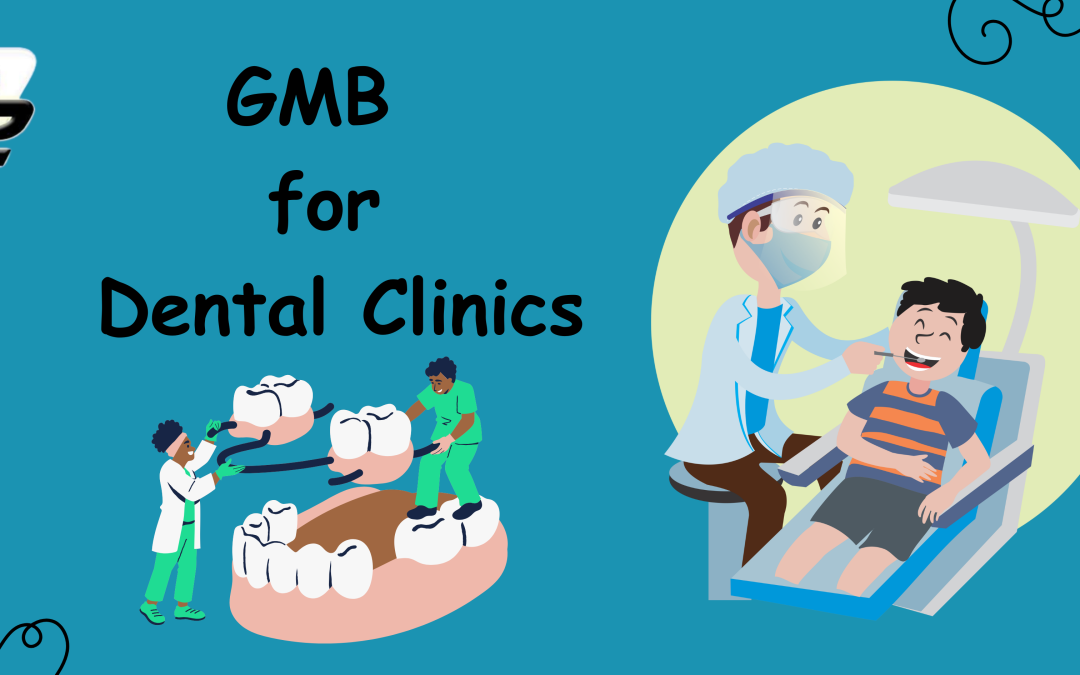
by Shashikanth Heerekar | Jan 13, 2026 | Business & Branding
Introduction
Every business needs Google My Business (GMB), a free tool provided by Google that helps companies become more visible online. GMB allows businesses to appear on Google Search and Google Maps when people search for their services. It displays important details such as the business name, contact information, and location, which helps build trust and transparency with customers.
For dental clinics, GMB is especially beneficial because it helps potential patients easily find the clinic, view reviews, and contact them directly. Today, most businesses use GMB to improve their local search visibility, strengthen their online presence, and attract more customers through better Google search optimization.
What is GMB for clinics?
GMB for clinics means using Google My Business (now called Google Business Profile) to help clinics show up on Google Search and Google Maps when people look for medical services nearby.
It displays clear details like the clinic name, location, phone number, timings, services, photos, and patient reviews. This helps build trust and makes it easy for patients to contact the clinic.
For example, when someone searches “children’s dental clinic near me,” an optimized GMB profile helps the clinic appear in local search results. The listing shows key details like clinic hours, services, photos, and patient reviews. This makes it easy for patients to trust the clinic and contact it for an appointment.
How to Improve GMB Ranking?
When a clinic registers and optimizes its Google My Business (GMB) profile, it can appear higher in Google Search and Maps results. This increased visibility helps attract more visits, calls, and inquiries from potential patients.
1. Precision and Completeness of Information
The precision and completeness of your information are crucial for building customer trust and improving your visibility in local search results and Google Maps.
For example, high-quality photos on its GMB profile appear higher in local searches like “dentist near me.” Patients can easily find the clinic, read reviews, get directions, and book appointments, which builds trust and increases visits.
2. Reviews and Ratings
Reviews and ratings are feedback from patients about their healthcare experiences, crucial for provider reputation, influencing new patients, and building trust, typically using star systems. Effective providers monitor these reviews, respond thoughtfully to negatives, and encourage honest feedback to boost digital credibility.
For instance, a dental clinic receives a 5-star review from a patient praising their friendly staff and pain-free treatment. The clinic responds politely, thanking the patient for their feedback.
3. Visual Depictions and Virtual Tours
Even the services taken by the patients are also made if they post anything related to the services that they are satisfied with, the services that can impact the client to get more clients.
For example, patient-shared photos and clinic images serve as visual depictions and virtual tours, helping improve online visibility and build trust with potential patients.
4. Leverage Google Posts
By updating information on social media platforms when needed, businesses can easily inform customers about the services they offer.
For example, dental clinics can share updates about available treatments, changes in services, or new facilities, helping patients stay informed and engaged while building trust and visibility online.
5. Simplify Online Appointment Scheduling
To simplify online appointment scheduling, use dedicated software like Calendly or HubSpot, enable self-service booking with customizable links, automate reminders (SMS/email), integrate with your calendar (Google/Outlook) to prevent double-bookings, and offer flexible options (like wave scheduling).
For example, a dental clinic uses an online booking link on its website and GMB profile, allowing patients to book available slots and receive automatic reminders, making scheduling fast and easy.
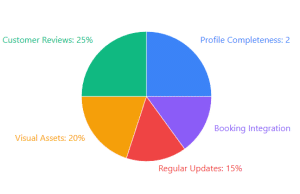
This chart highlights the main elements that improve a Google Business Profile, with Customer Reviews and Profile Completeness having the highest impact. Visual Assets, Regular Updates, and Booking Integration support visibility and make it easier for customers to engage and take action.
How to Benefit from Google My Business
Businesses should fully set up and regularly optimize their profile. Start by adding accurate details such as your business name, address, phone number, working hours, website, and services.
- Improves Local Visibility: Helps your business appear in Google Search and Google Maps.
- Attracts More Customers: Makes it easy for people to call, visit, or message your business.
- Builds Trust: Customer reviews and ratings increase credibility.
- Boosts Local SEO: Improves rankings for “near me” and location-based searches.
- Provides Important Business Info: Shows address, phone number, hours, and services clearly.
- Increases Website Traffic: Direct links drive visitors to your site.
- Engages Customers: Posts, photos, and updates keep your profile active.
- Free Tool: No cost to set up or manage.
Conclusion
Google My Business (GMB), now known as Google Business Profile, is one of the most powerful tools for improving local SEO for dental clinics. By optimizing your GMB profile with accurate business information, patient reviews, photos, Google Posts, and online appointment booking, dental clinics can rank higher on Google Search and Google Maps.
A well-managed GMB profile helps attract nearby patients, increase calls and appointments, build trust, and strengthen online visibility. For dental clinics aiming for consistent local growth and long-term success, GMB optimization is essential.
Regular monitoring and updates ensure the profile stays active, competitive, and aligned with Google’s latest guidelines. Investing time in GMB optimization delivers long-term benefits by driving quality local traffic and improving patient engagement.
FAQs
1. What is Google My Business for dental clinics?
Google My Business (now called Google Business Profile) helps dental clinics appear on Google Search and Google Maps. It shows clinic details like location, contact information, services, photos, and patient reviews, making it easier for patients to find and contact the clinic.
2. How does GMB help dental clinics get more patients?
GMB improves local search visibility, allowing dental clinics to appear in “near me” searches. A well-optimized profile attracts more calls, website visits, and appointment bookings from nearby patients.
3. How often should a dental clinic update its GMB profile?
Dental clinics should update their GMB profile regularly, especially when there are changes in working hours, services, photos, or offers. Posting updates weekly or biweekly helps improve engagement and rankings.
4. Do patient reviews affect GMB ranking?
Yes, patient reviews play a major role in GMB ranking. More positive reviews, higher ratings, and timely responses help build trust and improve visibility on Google Maps and local search results.
5. Can GMB help dental clinics rank on Google Maps?
Yes, optimizing Google Business Profile is essential for ranking on Google Maps. Accurate information, reviews, photos, local keywords, and active engagement improve Maps visibility.







